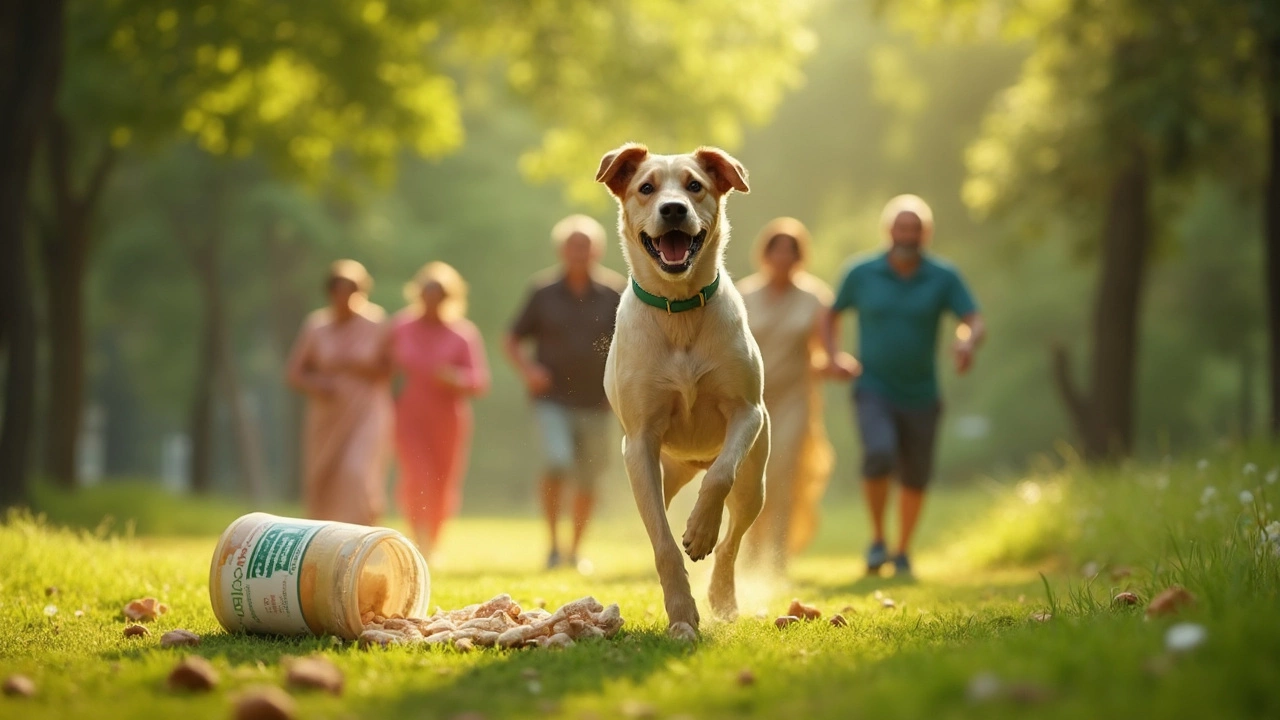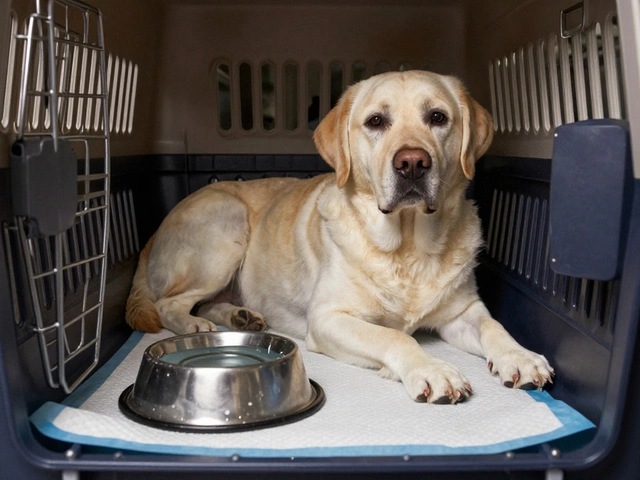
Dogs and protein shakes—sounds weird, right? You might be surprised how often pet owners wonder if protein powders meant for gym rats could help their pup bulk up too. Maybe you’ve got a super active dog that runs like the wind, or an older pup losing some muscle. It’s tempting to think a scoop of protein powder could be the easy fix.
But here’s the thing: most protein shakes are built for people, not pets. The flavors, sweeteners, additives—even the protein levels—are tweaked for the human gut, not a dog’s. That quick boost you’re hoping for could actually do the opposite and make your dog feel pretty rough.
If you’re thinking about giving your dog a protein supplement, hang on a sec. There are some big differences between what our dogs need and what a typical protein shake delivers. Blindly adding human supplements can set you up for a vet visit you don’t want. Before you pull out that shaker bottle, you need to know what’s in those powders, why they could spell trouble, and what to do instead if your dog really does need extra protein.
- Why Are Protein Shakes Even a Thing for Dogs?
- What’s Actually Inside Human Protein Shakes?
- How Dogs React to Extra Protein
- Who Might Need More Protein (and Who Definitely Doesn’t)
- Safer Ways to Support Your Dog’s Protein Needs
Why Are Protein Shakes Even a Thing for Dogs?
It’s not as wild as it sounds—dog owners are always looking for ways to help their pups stay healthy and active. That’s why the idea of protein shakes for dogs has become a real thing, especially among people with super athletic or older dogs. When you see buff dogs on social media, or hear about canine athletes in working roles, it makes sense people start thinking, “Should I be giving my dog extra protein too?”
Here’s where it starts: Some dog sports, like agility or dock diving, put a big demand on a dog's muscles. Owners want to help their dogs recover better, add muscle, or keep their joints strong as they age. That’s when protein supplements pop up on their radar—usually in the form of protein shakes or powders made for humans.
Sometimes, vets will talk about protein if a dog is underweight from illness or senior health issues. But for the average dog eating regular, quality food, dietary protein is almost never a problem. Most commercial dog food is already loaded with the essential protein levels pups need for strong muscles and good health.
- Active or working dogs who burn tons of energy every day
- Elderly dogs with shrinking muscle mass
- Dogs recovering from surgery or major illness
That’s the crowd who sometimes gets a protein boost—but almost never straight from a muscle-man’s supplement tub. Vets usually suggest special high-protein food or dog-specific supplements, not human shakes.
| Dog Activity Level | Average Protein Needs (% of diet) |
|---|---|
| Pet/Companion | 18-22% |
| Active/Working | 22-28% |
In short, you’re not alone if you’ve wondered about protein supplements for your dog. The key thing is: the hype comes from special circumstances. For most healthy dogs on decent food, those flashy protein shakes just aren’t needed.
What’s Actually Inside Human Protein Shakes?
Crack open the label on most human protein shakes, and you’re looking at a cocktail of stuff—most of it totally designed for people, not dogs. The basic idea is simple: a decent chunk of protein (usually from whey, soy, or pea protein), blended with a bunch of other ingredients that help with taste, shelf life, or that post-workout vibe.
Here’s what you actually find in popular protein shakes and powders:
- Protein Sources: Whey concentrate, whey isolate, casein (all dairy-based), soy, pea, rice, egg, or sometimes collagen.
- Sugar and Sweeteners: Stuff like sucralose, stevia, Splenda, aspartame, and sometimes just cane sugar. Dogs’ guts don’t always handle these well, and sugar alcohols (like xylitol) can be downright toxic to dogs—even tiny amounts.
- Artificial Flavors and Dyes: Vanilla, chocolate, berry, coffee – plus things to make the powder look and smell appetizing for humans. Not helpful for dogs, and occasionally causing stomach upset.
- Fats: Some powders toss in added MCT oil (from coconut) or vegetable fats to make them creamy or "keto-friendly." Extra fat can mess with a dog’s digestion, or cause pancreatitis in sensitive pups.
- Vitamins and Minerals: Some shakes are loaded with extra B-vitamins, iron, and minerals to appeal to athletes – not necessarily balanced for a dog’s body.
- Thickeners and Fillers: You’ll spot stuff like gums (guar gum, xanthan gum), lecithin, or even added fiber, which don’t always sit well with a dog’s digestive system.
Got a sensitive pup? Here’s a fun fact: In a 2023 check of five best-selling protein shake brands, every single one included some form of artificial sweetener—not a single one was built with pets in mind.
The big takeaway: what’s inside that human protein shake might be fine for post-gym recovery, but could end up causing an upset stomach, diarrhea, or way worse problems for your dog. Even if your dog needs extra protein, the extras in human shakes just aren’t worth the risk. Always check those ingredient lists before sharing anything off the shelf with your dog.

How Dogs React to Extra Protein
So, what actually happens when you start giving your dog way more protein, especially from those protein shakes designed for humans? Most healthy dogs don’t need a huge extra dose of protein. Their bodies are already good at getting what they need from good dog food. When dogs get more protein than they can use, their bodies just break it down and use what they need, then send the rest out as waste. Seems harmless, but there can be some sneaky side effects if you go overboard.
First, too much protein can stress out your dog’s kidneys. That’s because the kidneys have to work harder filtering all the leftover stuff. For most young, healthy dogs, that’s not a big deal, but if your dog is older, has kidney issues, or has had any urinary problems, it’s a risky move. Some vets say dogs with kidney disease need way less protein, not more.
Then you’ve got the tummy trouble. Most dogs don’t handle the sweeteners, cocoa, or artificial flavors in human protein shakes. Your pup could end up with diarrhea, vomiting, or just acting “off.” Even something as basic as lactose in whey protein can send a lot of dogs running for the yard with the runs. Soy protein is another one that turns stomachs for lots of pups.
Worried about weight gain? Extra protein still adds calories. If your dog isn’t an athlete or working dog, those calories stack up fast. Obesity in dogs is already a huge issue in America—around 56% of dogs are considered overweight or obese, according to 2023 data from the Association for Pet Obesity Prevention.
If you’re thinking more is always better, here’s a quick table showing what vets generally recommend for daily protein intake:
| Dog Type | Protein % (Dry Matter) |
|---|---|
| Adult, regular activity | 18-25% |
| Puppies | 22-32% |
| Highly active/working dogs | 25-32% |
Most commercial dog foods already hit these targets. When you throw dog supplements and protein shakes on top, you’re messing with a balance that’s already carefully made for your dog’s needs. Too much isn’t just a waste—it can actually harm their health long-term.
Who Might Need More Protein (and Who Definitely Doesn’t)
Not every dog needs a protein supplement—in fact, most don’t. For healthy adult dogs, regular dog food covers all their dog nutrition needs. Throwing in extra protein shakes when it’s not needed can actually stress out organs like the kidneys and upset your dog’s stomach. But there are situations where a dog could use a little more protein in their diet.
Dogs with legit reasons for more protein usually fall into these categories:
- Puppies: Growing pups use protein like crazy to build their bodies. They sometimes need food with higher protein, but puppy-formula dog food usually covers that.
- Active or Working Dogs: Think herding dogs, sled dogs, or pups that do agility all the time. They burn through protein quickly for energy and muscle repair, but high-protein kibble is a better fix than powder drinks.
- Pregnant or Nursing Dogs: Mom dogs feeding a litter need more protein than usual. Specialized food is best instead of people supplements.
- Senior Dogs with Muscle Loss: Vets sometimes suggest upping protein in the diet for older dogs if they’re losing muscle, but this needs a vet’s go-ahead.
But who definitely should not get extra protein?
- Healthy Adult Dogs: Normal, chill dogs get enough from standard dog food. More protein adds zero benefits, and too much can mess with their systems.
- Dogs with Kidney or Liver Issues: Adding dog supplements and extra protein can make medical problems worse, leading to complications like dehydration and toxins in the blood.
| Type of Dog | Needs More Protein? | Best Source |
|---|---|---|
| Puppies | Yes, for growth | Puppy-formula food |
| Active/Working Dogs | Usually | High-protein kibble |
| Pregnant/Nursing Females | Yes, during period | Specialized dog food |
| Healthy Adults | No | Standard dog food |
| Dogs with Kidney/Liver Disease | No | Vet-recommended diet |
Short version: don’t DIY dog health with a protein shake unless your vet says your pup’s diet actually needs a boost. Chances are, decent-quality dog food is already doing the heavy lifting.

Safer Ways to Support Your Dog’s Protein Needs
If you’re worried your dog might need a protein boost, you don’t have to reach for human protein shakes. Dogs really do best with real food or supplements designed just for them. Here are some simple—and much safer—ways to help your buddy get enough protein without risking side effects from stuff meant for people.
- High-Quality Dog Food: Most commercial dog foods labeled for “active” or “performance” dogs already have extra protein. Always check the ingredients list. You want real meat listed first and no weird fillers.
- Lean Meats: Cooked chicken, turkey, or lean beef (without added salt, seasonings, or fat) make great protein toppers. Chop it up and sprinkle over their regular food. No fried food or bones—just plain cooked meat.
- Eggs: Scrambled or hard-boiled eggs (plain, no butter or oil) are a cheap way to add a protein punch. One egg a couple times a week is plenty for a medium-sized dog.
- Dog-Specific Protein Supplements: If your vet says your dog really needs a supplement, use a product made for dogs. These skip artificial sweeteners, chocolate, and other harmful stuff that human protein shakes have. Your vet can point out brands they trust.
- Track Their Progress: Watch for signs of improvement—shinier fur, better energy, or a bit more muscle tone. No dramatic changes? Ask your vet if something else is going on. Dogs rarely need extra protein unless they’re sick, super active, or seniors losing muscle.
Want to see how regular foods stack up? Here’s a quick cheat sheet with protein levels (per 100g) in dog-safe foods:
| Food | Protein (g per 100g) |
|---|---|
| Chicken breast (cooked) | 31 |
| Lean ground beef (cooked) | 26 |
| Egg, whole (boiled) | 13 |
| Salmon (cooked) | 25 |
So, before you even think about supplementing, check if you’re already feeding your dog what they need. Most healthy adult dogs get all their protein from their food and don’t need anything extra. Special cases—like athletes or dogs with medical needs—should always be handled with a vet’s advice. Safer, smarter, and way cheaper than experimenting with those powdery shakes.





